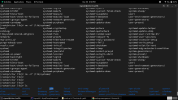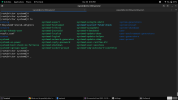Hi,
While I upto something i was deleted the dir of systemd inside /lib as the root. I was able those get know the deleted files with via my friend laptop as the same os and systemctl and systemd versions. As I was delete the folder '/lib/systemd' - I went on, and tried to re-instal the systemd. The pacakage was sucessfully re-installed.
After re-installing I found that the some of the files were missing with my previous versions, cause I have reinstalled as a fresh pacakage.
I was in the fear, wheather while re-booting it will create a problem or not. ( Or can I copy all the files missing under the dir ( /systemd ) from my friends laptop cause it was similar in versions)
If anyone can help please reply. thanks & regards in advance.
I have attached the files were inside the folder while I'm deleting, I able do to one thing 'press TAB' before deleting that was the files thier before deleting.
While I upto something i was deleted the dir of systemd inside /lib as the root. I was able those get know the deleted files with via my friend laptop as the same os and systemctl and systemd versions. As I was delete the folder '/lib/systemd' - I went on, and tried to re-instal the systemd. The pacakage was sucessfully re-installed.
After re-installing I found that the some of the files were missing with my previous versions, cause I have reinstalled as a fresh pacakage.
I was in the fear, wheather while re-booting it will create a problem or not. ( Or can I copy all the files missing under the dir ( /systemd ) from my friends laptop cause it was similar in versions)
If anyone can help please reply. thanks & regards in advance.
I have attached the files were inside the folder while I'm deleting, I able do to one thing 'press TAB' before deleting that was the files thier before deleting.



